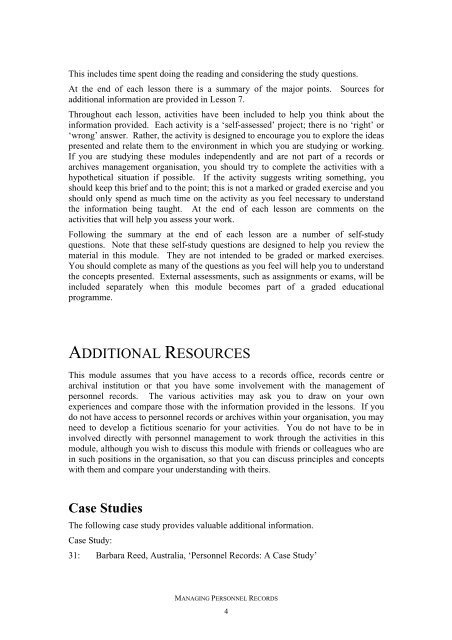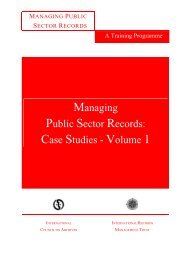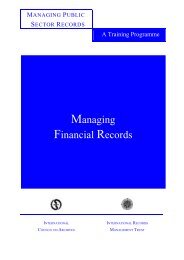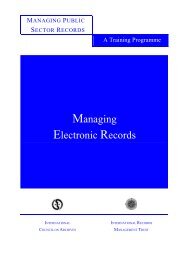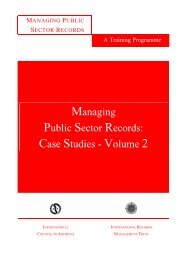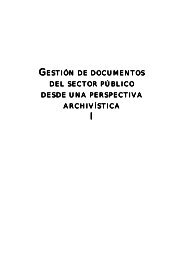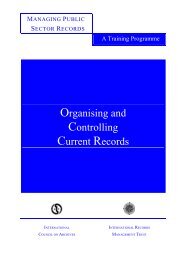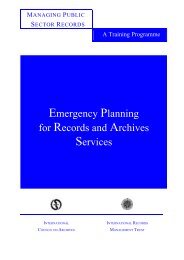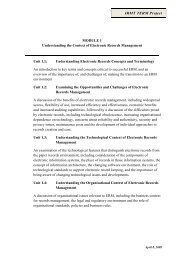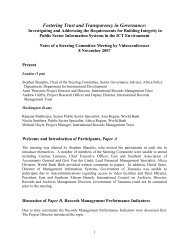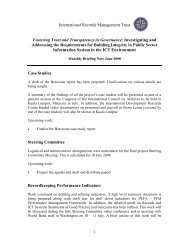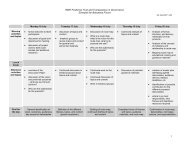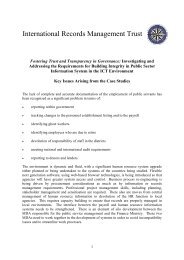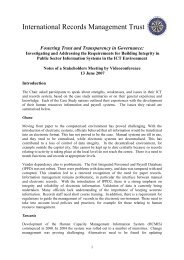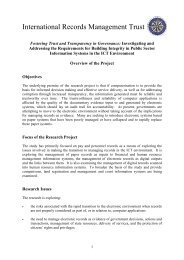Managing Personnel Records - International Records Management ...
Managing Personnel Records - International Records Management ...
Managing Personnel Records - International Records Management ...
You also want an ePaper? Increase the reach of your titles
YUMPU automatically turns print PDFs into web optimized ePapers that Google loves.
This includes time spent doing the reading and considering the study questions.<br />
At the end of each lesson there is a summary of the major points. Sources for<br />
additional information are provided in Lesson 7.<br />
Throughout each lesson, activities have been included to help you think about the<br />
information provided. Each activity is a ‘self-assessed’ project; there is no ‘right’ or<br />
‘wrong’ answer. Rather, the activity is designed to encourage you to explore the ideas<br />
presented and relate them to the environment in which you are studying or working.<br />
If you are studying these modules independently and are not part of a records or<br />
archives management organisation, you should try to complete the activities with a<br />
hypothetical situation if possible. If the activity suggests writing something, you<br />
should keep this brief and to the point; this is not a marked or graded exercise and you<br />
should only spend as much time on the activity as you feel necessary to understand<br />
the information being taught. At the end of each lesson are comments on the<br />
activities that will help you assess your work.<br />
Following the summary at the end of each lesson are a number of self-study<br />
questions. Note that these self-study questions are designed to help you review the<br />
material in this module. They are not intended to be graded or marked exercises.<br />
You should complete as many of the questions as you feel will help you to understand<br />
the concepts presented. External assessments, such as assignments or exams, will be<br />
included separately when this module becomes part of a graded educational<br />
programme.<br />
ADDITIONAL RESOURCES<br />
This module assumes that you have access to a records office, records centre or<br />
archival institution or that you have some involvement with the management of<br />
personnel records. The various activities may ask you to draw on your own<br />
experiences and compare those with the information provided in the lessons. If you<br />
do not have access to personnel records or archives within your organisation, you may<br />
need to develop a fictitious scenario for your activities. You do not have to be in<br />
involved directly with personnel management to work through the activities in this<br />
module, although you wish to discuss this module with friends or colleagues who are<br />
in such positions in the organisation, so that you can discuss principles and concepts<br />
with them and compare your understanding with theirs.<br />
Case Studies<br />
The following case study provides valuable additional information.<br />
Case Study:<br />
31: Barbara Reed, Australia, ‘<strong>Personnel</strong> <strong>Records</strong>: A Case Study’<br />
MANAGING PERSONNEL RECORDS<br />
4


